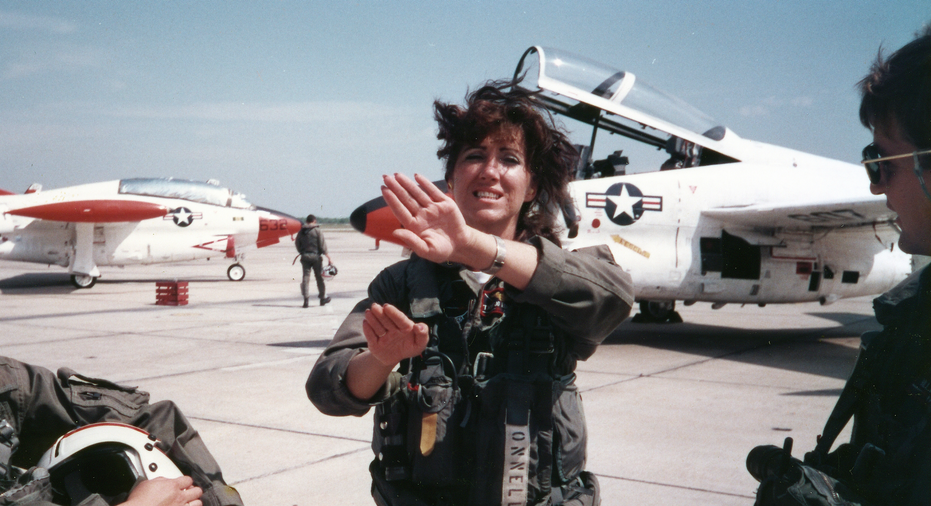Southwest Airlines pilot pushed Navy boundaries for flying

BOERNE, Texas – Tammie Jo Shults was determined to "break into the club" of male military aviators.
One of the first female fighter pilots in the U.S. Navy, Shults flew training missions as an enemy pilot during Operation Desert Storm, while working with other women to see a rule excluding them from combat flights repealed.
Twenty-five years later, Shults was at the controls of the Dallas-bound Southwest Airlines Flight 1380 Tuesday when it made an emergency landing in Philadelphia after one of the engines on the Boeing 737 exploded while the plane was traveling 500 mph (800 kph) at 30,000 feet (9144 m) with 149 people on board.
Shrapnel hit the plane and passengers said they had to rescue a woman who was being blown out of a damaged window. The woman later died of blunt force trauma to her head, neck and torso.
Shults calmly relayed details about the crisis to air traffic controllers, and passengers commended her handling of the situation.
"Everybody is talking about Tammie Jo and how cool and calm she was in a crisis, and that's just Tammie Jo," said Rachel Russo, a friend from Shults' church in Boerne, Texas, about 30 miles (48 km) northwest of San Antonio. "That's how she's wired."
Shults and the other pilot on board, First Officer Darren Ellisor, said in a statement Wednesday that they were simply doing their jobs.
"On behalf of the entire Crew, we appreciate the outpouring of support from the public and our coworkers as we all reflect on one family's profound loss," the two pilots said, adding that their "hearts are heavy."
Shults was commissioned into the Navy in 1985 and reached the rank of lieutenant commander, said Commander Ron Flanders, spokesman for Naval Air Forces in San Diego.
She was among the few to learn to fly the F/A-18 Hornet, a single-seat jet and the Navy's premier strike fighter aircraft, a privilege reserved for elite pilots, according to retired Navy helicopter pilot Andi Sue Phillips.
"When you pull those g's, you can actually feel your organs slamming on the inside of your ribs," Phillips said. "It's exhausting to put your body through those maneuvers."
Phillips said that that there was a lot of resistance for women to fly jets and for Shults "to fly a fighter aircraft when nobody even wanted her there is pretty amazing."
Women aviators were excluded from combat missions until the month after Shults got off active duty in March 1993. Flanders said Shults flew during Operation Desert Storm trainings as an aggressor enemy pilot, helping "male pilots hone their skills."
"Obviously it was frustrating," said Veteran Navy combat aviator Linda Maloney, who became among the first women to join a combat military flying squadron and was deployed to the Arabian Gulf. "We go through the same training that the guys do, and our hope was the Navy would allow us to fly in combat at some point."
Maloney featured Shults in her book, "Military Fly Moms," along with the stories and photos of 69 other women U.S. military veterans.
Shults wrote in the book about her determination to "break into the club" of male military aviators.
"There did not seem to be a demand for women pilots," she said, adding that her Hornet flight training squadron did not share her commander's "open-mindedness about flying with women."
Russo and Staci Thompson, who has known Shults for about 20 years and was nanny to her two children when they were small, said she "loved" her military career but has alluded to frustrations and challenges that came with it.
They also said she embraced those experiences to make her stronger and guide her into a role as a mentor to young female pilots or girls thinking about a military career.
"She learned a lot about overcoming things as a woman in a male-dominated field," Russo said.
Shults grew up in a New Mexico ranch near Holloman Air Force Base, and was a 1983 graduate of MidAmerica Nazarene University in Olathe, Kansas, where she earned degrees in biology and agribusiness.
Her husband, Dean Shults, also is a Southwest pilot.
"She's a formidable woman, as sharp as a tack," said Gary Shults, a dentist in San Antonio. "My brother says she's the best pilot he knows."
___
Schmall reported from Fort Worth, Texas. Associated Press writers Adam Kealoha Causey in Oklahoma City, Ben Finley in Norfolk, Virginia, and Terry Wallace and business writer David Koenig in Dallas contributed to this story.



















